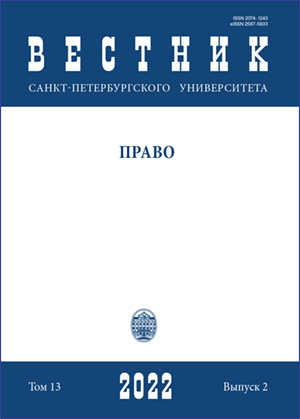Improving the institution of declaring information about income, expenditure, property and property obligations in the context of digitalization
DOI:
https://doi.org/10.21638/spbu14.2022.204Abstract
The relevance of scientific research is the widespread use of systems for declaring information about state and other public persons, about their income, expenses, property and property obligations in those countries that carry out anti-corruption activities. The purpose of the article is to substantiate the expediency of improving the organization of control over the income of state and other public persons. An algorithm of actions performed using digital technologies is proposed. The program independently receives all the necessary information about a person’s property status from various official registers, and the program evaluates this information and makes one of two decisions: to stop monitoring, or to transfer the relevant information to a controlling institution, for example, to the prosecutor’s office. The main results of the study. The main problem, according to the author of the article, is that reporting on their property status is the responsibility of the declarant himself. In order to prepare such a report, a civil servant must perform many formalities (meet the deadline for submitting the declaration; fill out the document correctly; receive information from state registers, banks and other organizations in a timely manner; receive information from your husband/wife, minor children and others). For non-compliance with these requirements, the legislation provides for the legal responsibility of the declarant. The author proposed his own algorithm of control, which should be carried out for the property status of officials. The author reveals the scope of the digital program for monitoring the property status of officials. Such a program will allow not only to compare the income and expenses of officials, but also to identify violations of tax legislation, as well as legislation in the field of AML/CFT (Anti-Money Laundering/Combating the Financing of Terrorism).
Keywords:
corruption, control, declaration, property, legislation, programming
Downloads
References
Downloads
Additional Files
Published
How to Cite
Issue
Section
License
Articles of "Vestnik of Saint Petersburg University. Law" are open access distributed under the terms of the License Agreement with Saint Petersburg State University, which permits to the authors unrestricted distribution and self-archiving free of charge.






